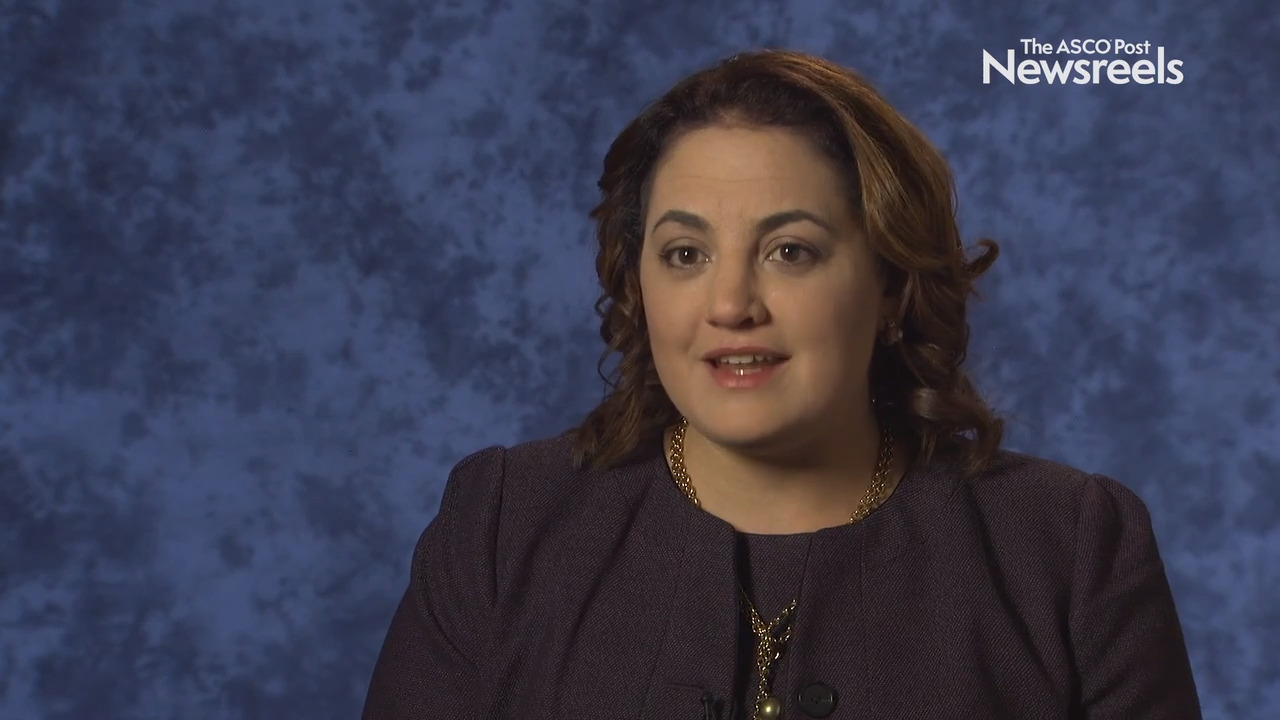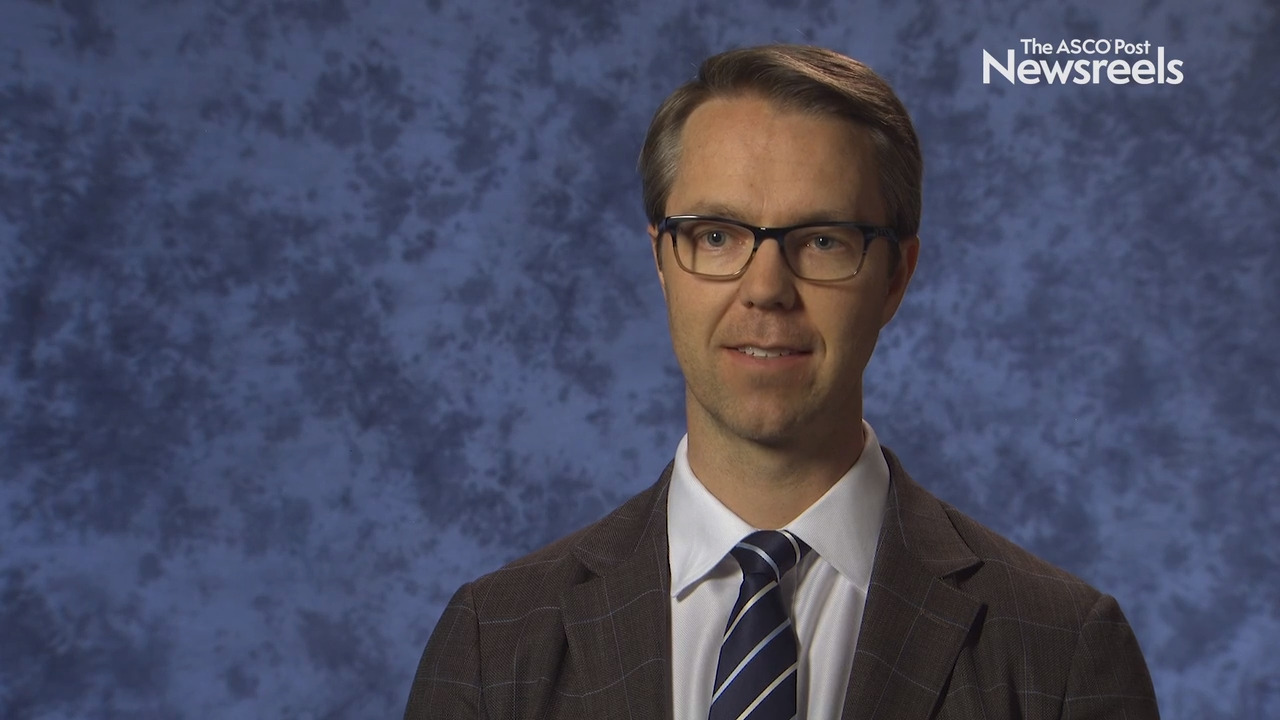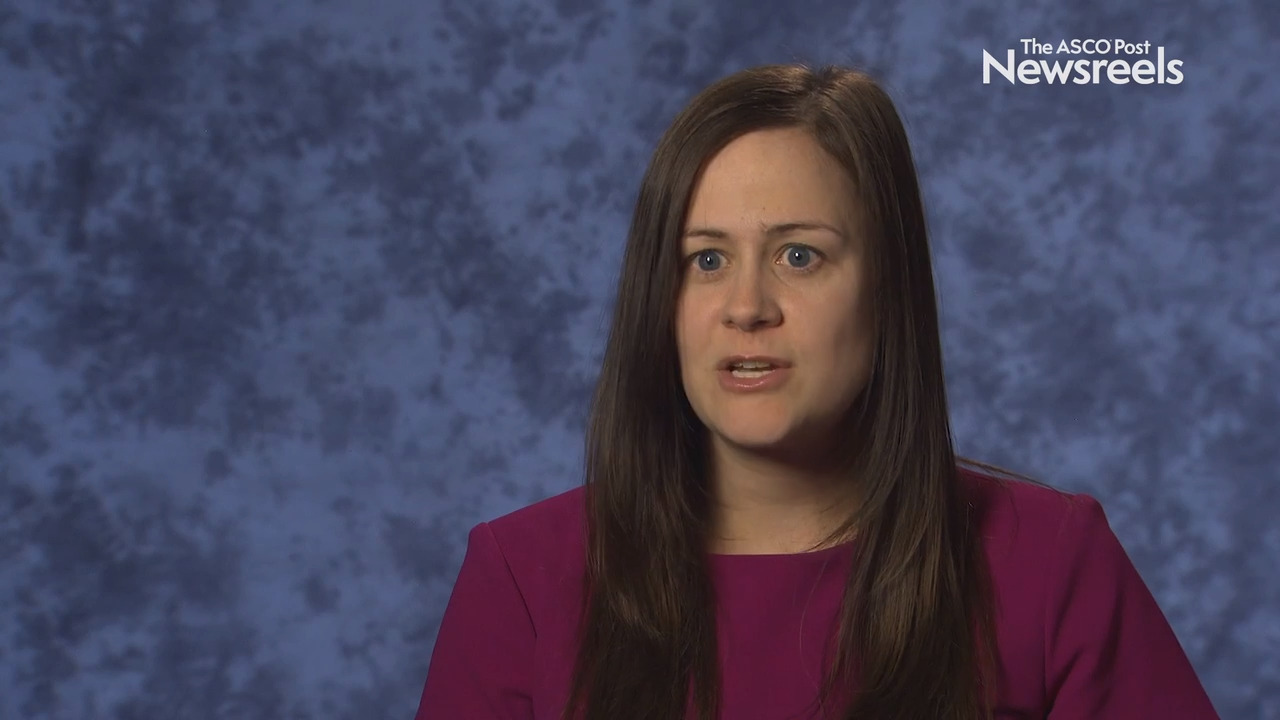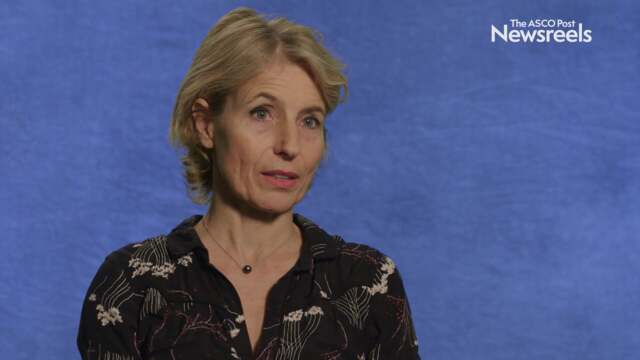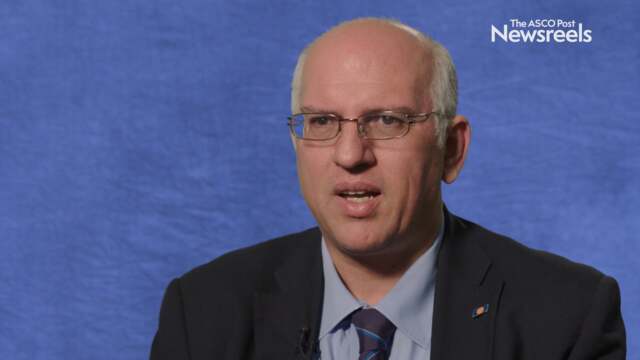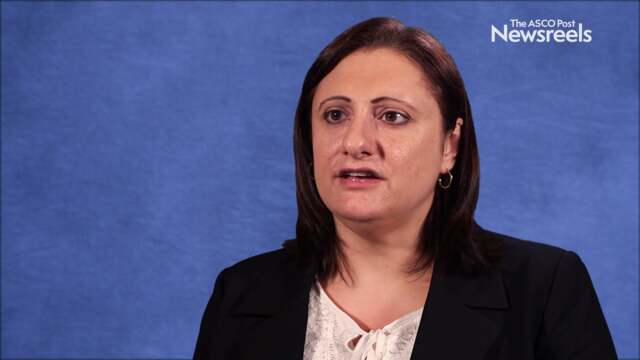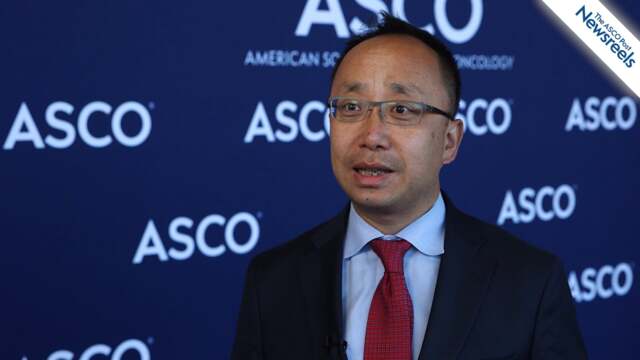SABCS 2018: Oxybutynin for the Management of Hot Flashes in Women Unable to Receive Hormone Replacement Treatment
Treatment with oxybutynin helped reduce the frequency and intensity of hot flashes for women who could not take hormone replacement therapy, including breast cancer survivors, according to the results of a trial presented at the 2018 San Antonio Breast Cancer Symposium by Leon-Ferre et al (Abstract ...
Alok A. Khorana, MD, on Reducing VTE Associated With Systemic Cancer Therapy: Results From the CASSINI Trial
Alok A. Khorana, MD, of the Cleveland Clinic, discusses study findings on rivaroxaban thromboprophylaxis in high-risk ambulatory patients, which showed a reduction in venous thromboembolism and related death (Abstract LBA1).
ASH 2018: CASSINI Trial: Rivaroxaban Thromboprophylaxis for VTE Prevention in Patients With Cancer
A new study suggests taking a direct oral anticoagulant (DOAC) can reduce the risk of harmful blood clots in patients undergoing cancer treatments, without substantially increasing the risk of bleeding problems. Findings from the CASSINI trial were presented by Khorana et al at the 2018 American...
ASH 2018: Apixaban for the Treatment of Cancer-Associated VTE
According to findings from the ADAM VTE trial, an oral drug, apixaban (Eliquis), is safe and effective in treating blood clots in patients undergoing cancer therapy. The drug was associated with fewer major bleeding events and fewer recurrent blood clots compared to low–molecular-weight. ...
Allison S. Betof Warner, MD, PhD, on Managing Immune-Related Adverse Events: Incorporating Guidelines
Allison S. Betof Warner, MD, PhD, of Memorial Sloan Kettering Cancer Center, discusses the rationale for immunotherapy and combination treatments, identifying the agents that lead to toxicities, and ways to manage them.
Eric Roeland, MD, on Preventing Chemotherapy-Induced Vomiting
Eric Roeland, MD, of Massachusetts General Hospital, discusses the wide variation among physicians in preventing vomiting from highly emetogenic chemotherapy (Abstract 74).
Elizabeth Jane Cathcart-Rake, MD, on Immunotherapy-Related Toxicities: More Common Than Originally Reported?
Elizabeth Jane Cathcart-Rake, MD, of the Mayo Clinic, discusses the frequency of side effects from immunotherapy, the need to closely monitor those receiving this treatment, and the role of clinicians in educating their patients on toxicities (Abstract 184).
NCRI 2018: COMPARE Study: Side Effects and Quality of Life Associated With Prostate Cancer Care
Men who have been newly diagnosed with prostate cancer say they would trade some improvement in their odds of survival for improvements in side effects and quality of life, according to research presented by Ahmed et al at the 2018 National Cancer Research Institute (NCRI) Cancer Conference...
Study Identifies Significant Risk Factors for Chemotherapy-Induced Febrile Neutropenia
New research by Family et al in JNCCN—Journal of the National Comprehensive Cancer Network identifies risk factors for chemotherapy-induced febrile neutropenia, a dangerously low white blood cell count that increases the risk of serious infection and fever. The study was led...
FDA Pipeline: What’s New in Biosimilars, Drug Reviews, Designations, and More
The U.S. Food and Drug Administration (FDA) recently issued the following new approvals and designations: Approval for Pegfilgrastim Biosimilar The FDA recently approved a pegfilgrastim biosimilar, pegfilgrastim-cbqv (Udenyca). The biosimilar has been approved to decrease the incidence...
2018 Palliative Care: Can an AI-Based App Help Manage Cancer-Related Pain?
A study of 112 patients with metastatic solid tumors found that the use of an artificial intelligence (AI)-based smartphone app reduced both the severity of patients’ reported pain and hospital admissions. After an 8-week period, patients who used the AI-powered app to monitor and address...
2018 Palliative Care: Immunotherapy-Related Adverse Events May Be More Common Than Initially Reported
An analysis of nearly 2,800 patients with non–small cell lung cancer (NSCLC) who received the immune checkpoint inhibitors nivolumab (Opdivo), pembrolizumab (Keytruda), or atezolizumab (Tecentriq) found that adverse events may be more common than reported in the initial trials that led...
Effect of Early Cardiotoxicity on Outcomes in Pediatric AML
In an analysis from the Children’s Oncology Group AAML0531 trial reported in the Journal of Clinical Oncology, Getz et al found that early treatment-related cardiotoxicity may be associated with poorer event-free and overall survival in pediatric acute myeloid leukemia (AML). Study Details...
Can Patients Use Topical Skin Creams During Radiation Therapy?
Contrary to the advice most patients with cancer receive when they go through radiation treatment, topical skin treatments, unless applied very heavily, may not increase the radiation dose to the skin and can be used in moderation before daily radiation treatments, according to findings from a new...
Thomas Galloway, MD, on Oropharyngeal Cancer: Improving Outcomes and Reducing Toxicity
Thomas Galloway, MD, of Fox Chase Cancer Center, summarizes a session on head and neck cancer that included findings on reducing oral mucositis, improving quality of life with deintensified chemoradiotherapy, and the costs of dose de-escalation (Scientific Session 31).
Caroline Robert, MD, PhD, on Immunotherapy Toxicities: Expert Perspective
Caroline Robert, MD, PhD, of Gustave Roussy Cancer Centre, discusses managing toxicities of immunotherapy, including neurotoxicity, and treating beyond acute adverse events.
Paolo A. Ascierto, MD, on Melanoma: Acute and Chronic Toxicities
Paolo A. Ascierto, MD, of Istituto Nazionale Tumori–Fondazione Pascale, discusses the breakthroughs in melanoma treatment and the challenges of managing toxicities, especially endocrine and neurologic side effects, which can require lifetime hormone replacement and may cause permanent dysfunction.
ESMO 2018: Pooled Analysis of Influence of Sex on Chemotherapy Efficacy and Toxicity in Esophagogastric Cancer
In an analysis presented by Davidson et al at the European Society for Medical Oncology (ESMO) 2018 Congress (Abstract 619PD_PR), data were pooled from four UK randomized controlled clinical trials of first-line chemotherapy in esophagogastric cancer, finding significant differences in a...
Small Study Shows Fecal Microbiota Transplantation May Help Restore Beneficial Bacteria in Patients With Cancer
Researchers have shown that autologous fecal microbiota transplantation may be a safe and effective way to help replenish beneficial gut bacteria in patients with cancer who require intense antibiotics during allogeneic hematopoietic stem cell transplantation. Their findings were published by Taur...
Angela M. Stover, PhD, on Patient-Reported Symptoms: Results From the STAR and PRO-TECT Trials
Angela M. Stover, PhD, of the University of North Carolina at Chapel Hill, discusses study findings on ways to alert clinicians when patients signal symptoms such as pain or diarrhea that may be cause for concern (Abstract 158).
Use of Patient-Reported Outcomes Version of CTCAE in Rectal Cancer Trial
As reported in the Journal of Clinical Oncology, Basch et al established the feasibility of using the National Cancer Institute patient-reported outcomes version of the Common Terminology Criteria for Adverse Events (PRO-CTCAE) in the setting of a multicenter clinical trial in locally advanced...
Addition of Hydroxycarbamide to Aspirin in Essential Thrombocythemia Without High-Risk Features
In a long-term follow-up of a study reported in the Journal of Clinical Oncology, Godfrey et al found that the addition of cytoreductive therapy with hydroxycarbamide to aspirin did not improve outcomes in patients with essential thrombocythemia aged 40 to 59 years without high-risk features or...
Study Finds Hispanic Pediatric Patients at Increased Risk of Methotrexate Neurotoxicity During Treatment for ALL
Case studies have reported a high prevalence of methotrexate subacute neurotoxicity among Hispanic adolescents with acute lymphoblastic leukemia (ALL), suggesting sensitivity to methotrexate therapy may differ by race and ethnicity. Now, a prospective study in pediatric patients with ALL has found...
ASCO/IDSA Clinical Practice Guideline Update: Antimicrobial Prophylaxis for Adult Patients With Cancer-Related Immunosuppression
As reported in the Journal of Clinical Oncology by Randy A. Taplitz, MD, of UC San Diego Health, and colleagues, ASCO and the Infectious Diseases Society of America (IDSA) have updated their joint guideline on antimicrobial prophylaxis for adult patients with immunosuppression associated with...
Actively Recruiting Clinical Trials Focused on Neurotoxicities of Treatment
The information contained in this Clinical Trials Resource Guide includes actively recruiting clinical studies focused on neurotoxicities of cancer treatment. These studies focus on the effects of chemotherapy on cognitive function, changes in resting state brain networks after stem cell...
Lack of Congruence Among Tools Used to Assess Cancer-Related Cognitive Dysfunction
THE ASSESSMENT of cognitive dysfunction in patients who have undergone chemotherapy is complex, and although a number of strategies are available, each has its limitations, according to Karin Olson, RN, PhD, Professor in the Faculty of Nursing at the University of Alberta, Edmonton, Canada. At...
Expert Point of View: Rajesh Lalla, DDS, PhD
COMMENTING ON the results of this trial of GC4419, Rajesh V. Lalla, DDS, PhD, President of the Multinational Association of Supportive Care in Cancer, said, “This study demonstrated this agent’s strong potential for the management of oral mucositis in patients receiving head and neck radiation...
Novel Therapy Reduces Duration of Chemoradiotherapy-Induced Mucositis in Patients With Head and Neck Cancer
GC4419, A SMALL molecule superoxide dismutase mimetic, reduced the duration, incidence, and severity of chemoradiotherapy-induced mucositis in patients with locally advanced head and neck cancer, with a safety profile comparable to that of placebo. This finding comes from a randomized phase IIb...
FDA Approves Lusutrombopag for Thrombocytopenia in Adults With Chronic Liver Disease
Today, the U.S. Food and Drug Administration (FDA) approved lusutrombopag (Mulpleta) for thrombocytopenia in adults with chronic liver disease who are scheduled to undergo a medical or dental procedure. L-PLUS 1 and L-PLUS 2 Approval was based on two randomized, double-blind, placebo-controlled...
Susan Blumel, RN, BSN, and Laura J. Zitella, MS, RN, ACNP-BC, AOCN, on Managing Toxicities of Immunotherapy
Susan Blumel, RN, BSN, of the University of Nebraska Medical Center, and Laura J. Zitella, MS, RN, ACNP-BC, AOCN, of Stanford Health Center, discuss immunotherapy, CAR T-cell toxicities, and the principles of team management.
C-Reactive Protein and Radiotherapy Skin Toxicity in Patients With Breast Cancer
In a study reported in the Journal of Clinical Oncology, Hu et al found that higher postradiotherapy levels of the inflammatory marker high-sensitivity C-reactive protein (hsCRP) were associated with an increased risk of early grade 4+ skin toxicity in patients with breast cancer. Study Details...
Delayed Skin Effects of Anti–PD-1 Therapy
Patients with cancer receiving anti–programmed cell death protein 1 (anti–PD-1) therapies who develop lesions, eczema, psoriasis, or other forms of autoimmune diseases affecting the skin may experience those adverse reactions on a delay—sometimes even after treatment has...
FDA Approves Filgrastim Biosimilar Filgrastim-aafi
On July 20, the U.S. Food and Drug Administration (FDA) approved filgrastim-aafi (Nivestym), a biosimilar to filgrastim (Neupogen), for all eligible indications of the reference product. “The FDA approval of filgrastim-aafi marks an important step in helping expand access to critical...
Rivaroxaban vs Dalteparin in Patients With Venous Thromboembolism
In a UK pilot trial (SELECT-D) reported in the Journal of Clinical Oncology, Young et al found that the oral factor Xa inhibitor rivaroxaban was associated with a lower rate of recurrent venous thromboembolism (VTE) but a higher rate of clinically relevant nonmajor bleeding compared with the...
Quick Takes From Original Research Presented at the 2018 NCCN Annual Conference
THE QUANTITY of original research presented at the National Comprehensive Cancer Network® (NCCN®) Annual Conference has been growing, and at the 2018 meeting, 121 researchers presented their work. The ASCO Post captured some of the findings for this report. Blood Markers Correlate With Anti–PD-1...
Early Detection and Intervention Reduce Breast Cancer–Related Lymphedema
A NEW STUDY has found that early detection along with a simple intervention can be highly effective in preventing breast cancer–related lymphedema for at-risk women. According to data presented at the 2018 Annual Meeting of the American Society of Breast Surgeons,1 82% of women identified at an...
FDA Approves First Biosimilar to Pegfilgrastim to Help Reduce the Risk of Infection During Myelosuppressive Chemotherapy
On June 4, the U.S. Food and Drug Administration (FDA) approved pegfilgrastim-jmdb (Fulphila) as the first biosimilar to pegfilgrastim (Neulasta) to decrease the chance of infection as suggested by febrile neutropenia in patients with nonmyeloid cancer who are receiving myelosuppressive...
Jun J. Mao, MD, MSCE, on Insomnia in Cancer Survivors: Trial Results
Jun J. Mao, MD, MSCE, of Memorial Sloan Kettering Cancer Center, discusses study findings on the effect of acupuncture vs cognitive behavior therapy in cancer survivors experiencing insomnia (Abstract 10001).
Ryan D. Nipp, MD, on Electronic Symptom Monitoring: Trial Results
Ryan D. Nipp, MD, of Massachusetts General Hospital, discusses study findings on electronic symptom monitoring vs usual care to assess whether the intervention, tested in hospitalized patients with advanced cancer, can improve symptom burden and reduce the risk of readmission (Abstract 10005).
Safety of PD-1/PD-L1 Inhibitors in Patients With NSCLC and Preexisting Autoimmune Disorders
In a study reported in the Journal of Clinical Oncology, Leonardi et al found that programmed cell death protein 1 (PD-1)/programmed cell death ligand 1 (PD-L1) inhibitor monotherapy in patients with non–small cell lung cancer (NSCLC) and autoimmune disorders worsened such disorders in a...
Treating Insomnia in Cancer Survivors
A Patient-Centered Outcomes Research Institute–supported randomized clinical trial of cancer survivors showed that 8 weeks of either acupuncture or cognitive behavioral therapy for insomnia (CBT-I) decreased the severity of insomnia among cancer survivors, though improvements were greatest among...
FDA Approves First Epoetin Alfa Biosimilar for the Treatment of Anemia
On May 15, 2018, the U.S. Food and Drug Administration (FDA) approved epoetin alfa-epbx (Retacrit) as a biosimilar to epoetin alfa (Epogen/-Procrit) for the treatment of anemia caused by chronic kidney disease, chemotherapy, or use of zidovudine in patients with HIV infection. The biosimilar is...
Both Patients and Clinicians Face Challenges in Recognizing and Reporting Immune-Related Adverse Events
The publication of ASCO’s toxicity management guidelines for immune checkpoint antibodies by Brahmer and colleagues,1 reviewed in this issue of The ASCO Post, has been long awaited, considering more than 15 distinct indications have been granted by the U.S. Food and Drug Administration (FDA). The ...
ASCO Clinical Practice Guideline on Managing Immune-Related Adverse Events: Next Big Step for Immune Checkpoint Inhibitors
The publication of the ASCO clinical practice guideline for the management of immune therapy–related adverse events—reviewed in this issue of The ASCO Post—represents an important next step in the incorporation of checkpoint blocking antibodies as standard cancer treatment modalities.1 The U.S....
ASCO Clinical Practice Guideline: Management of Immune-Related Adverse Events From Immune Checkpoint Inhibitor Therapy
As reported in the Journal of Clinical Oncology by Julie R. Brahmer, MD, of Johns Hopkins Kimmel Cancer Center, and colleagues, ASCO has released a clinical practice guideline on management of immune-related adverse events in patients receiving immune checkpoint inhibitor therapy.1 Immune...
The Pharmacist’s Role in Educating the Health-Care Team About Adverse Effects of Immune Checkpoint Inhibitors
Named by ASCO as Advance of the Year for both 2016 and 2017,1 and with more than 10 U.S. Food and Drug Administration–approved indications—and more on the way—it’s safe to say the era of cancer immunotherapy is upon us. To prepare, physicians must understand not only which patients will benefit,...
Rivaroxaban May Reduce Risk of Venous Thromboembolism in Patients With Cancer
Patients with cancer have an increased risk of developing blood clots, with roughly one in five experiencing venous thromboembolism (VTE)—either deep-vein thrombosis (DVT) or pulmonary embolism (PE). Although there are many causes and risk factors for VTE, patients with cancer are...
FDA Approves First Epoetin Alfa Biosimilar for the Treatment of Anemia
On May 15, the U.S. Food and Drug Administration (FDA) approved epoetin alfa-epbx (Retacrit) as a biosimilar to epoetin alfa (Epogen/Procrit) for the treatment of anemia caused by chronic kidney disease, chemotherapy, or use of zidovudine in patients with HIV infection. Epoetin alfa-epbx is also...
2018 ASCO: More Choices for Treating Insomnia in Cancer Survivors: Acupuncture and Cognitive Behavioral Therapy
A Patient-Centered Outcomes Research Institute (PCORI)-supported randomized clinical trial of cancer survivors showed that 8 weeks of either acupuncture or cognitive behavioral therapy for insomnia (CBT-I) decreased the severity of insomnia among cancer survivors, though improvements were greatest...
National Survey Examines Oncologists' Practices, Beliefs on Medical Marijuana Use
Data from a new survey show that as many as 80% of oncologists have discussed medical marijuana use with their patients. According to the authors, this is the first nationally representative survey to examine oncologists’ practices and beliefs on the subject since the implementation of state...

